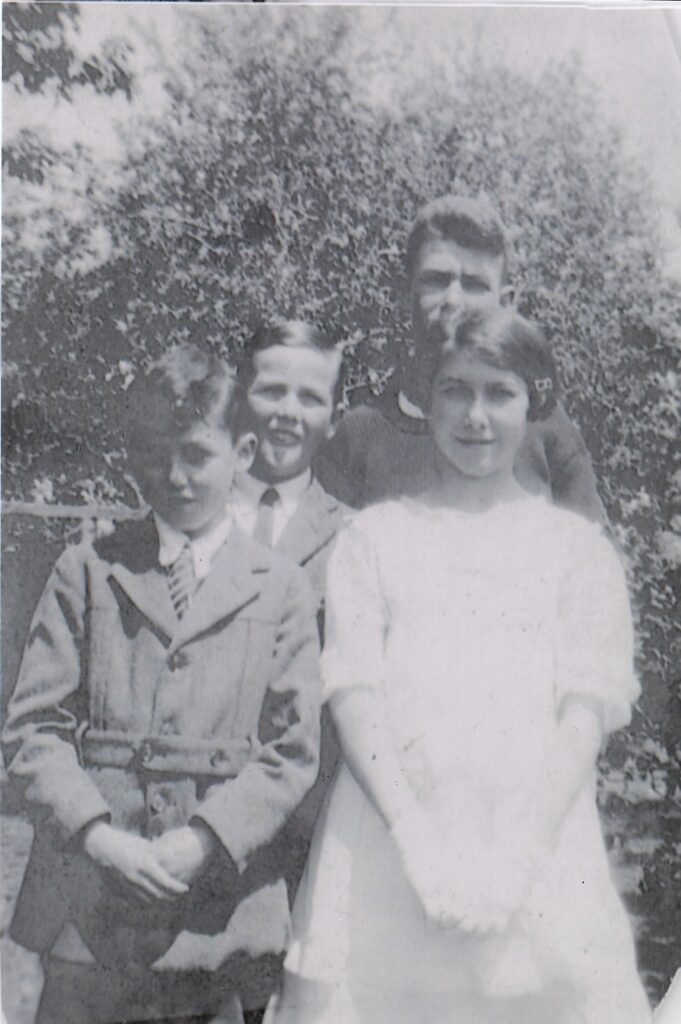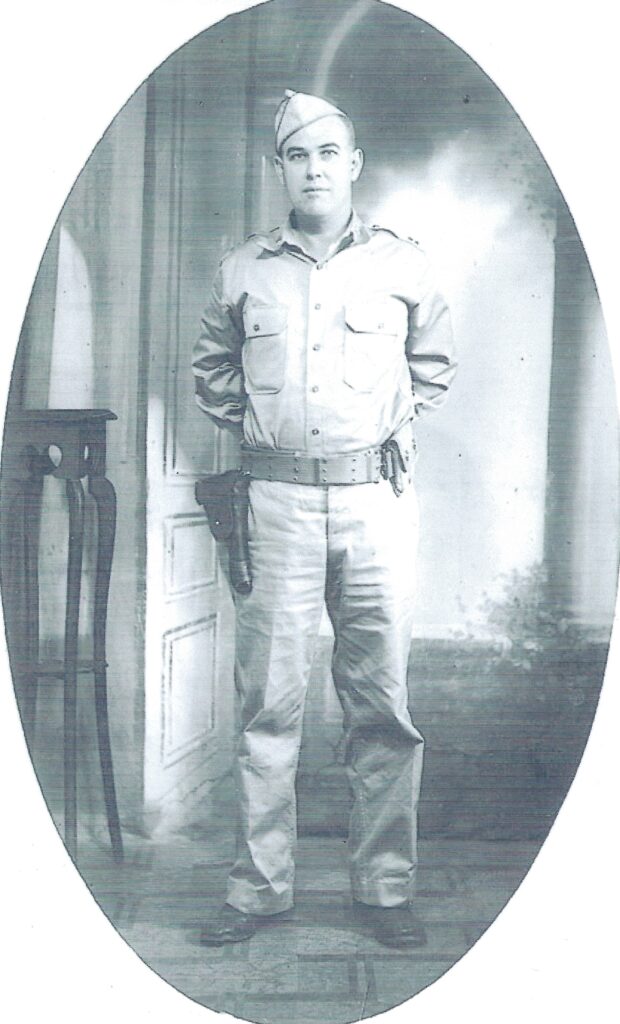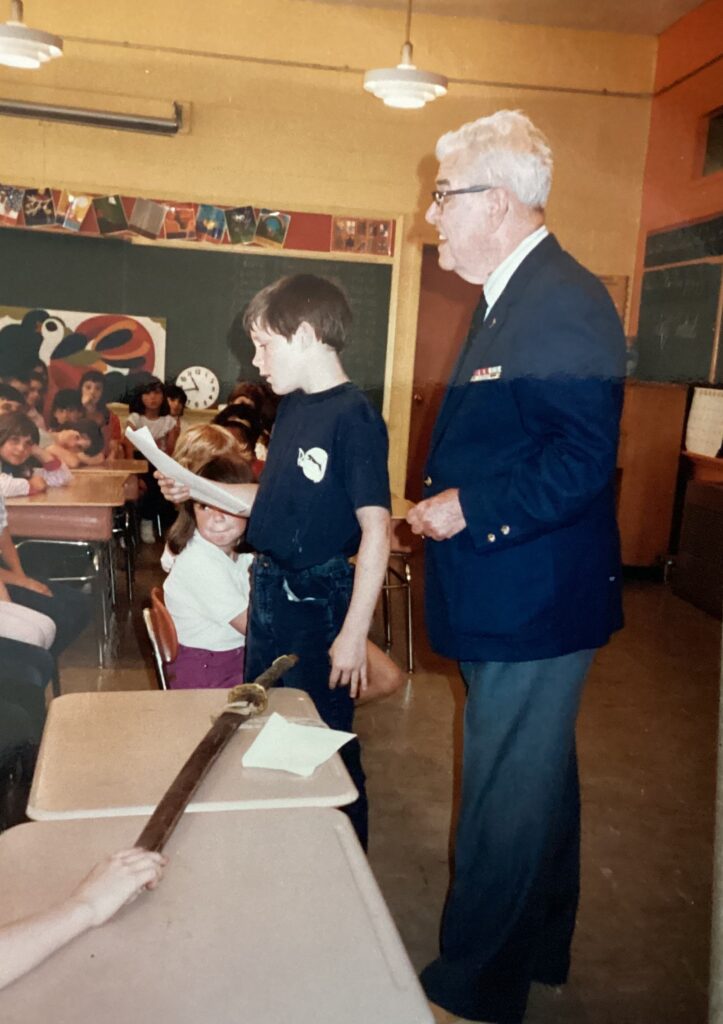Ralph T. Noonan (1909 – 1986) was born in Clinton, Massachusetts on October 27, 1909. His family was of Irish ancestry. And, like so many Irish, Ralph’s grandparents, the Foleys and the Noonans, came to America in the 1860s. On December 30, 1908, Catherine Foley (26) and Michael T. Noonan (33) were married by Reverend T. K. Heffernan at St. George’s Church in Saxonville. After their marriage, Michael and Catherine moved to Clinton where their four children were born.
It was a family tragedy that brought a young five-year-old boy to Framingham, Massachusetts. Ralph’s father died of pneumonia in 1914 while working on the campaign for David I. Walsh who was the Democratic candidate for Governor of Massachusetts. After Michael Noonan’s death, Catherine brought her four children to live in Framingham with her family. In 1920 she became head of the household at 1198 Worcester Road. To support a growing family, Catherine went to work at Travis Drug Store in Framingham Centre, just a short walk from home. Catherine’s children helped with finances by delivering papers, weeding gardens, mowing lawns, and picking blueberries and vegetables. The children attended Jonathan Maynard School, which had been recently built on the Centre Common in 1915. In those days organized recreation was not provided for youngsters. But the streams, the river, ponds, and fields around Framingham Centre provided plenty of fun for all the neighborhood kids. In the 1920s, baseball was America’s “National Passion” – it’s Golden Age! This passion was very much alive in Framingham as neighborhood kids organized and enjoyed pick-up baseball games in backyards and fields all around town.

In 1927 Ralph and his brother, Walter, graduated from Framingham High School. And perhaps as a preview of his civic involvement, Ralph was asked to give the class oration entitled, “The New Freedom.” In this mature young man’s oration, he spoke of wealth. Not that which is measured by material resources or silver and gold. But, the wealth of those Ralph calls, “the rank-and-file American, the toilers,” whose material gifts are limited. What is this wealth he speaks of? “It is the knowledge that they [the toilers] are individuals, persons free in body, mind, and heart; in a word, the one thing that constitutes their happiness is their freedom. That is the wealth dear to their heart…”
In the fall of 1928 Ralph entered the freshman class at Boston College. Finances would be a problem again for his family as a younger brother had just been accepted to the University of Notre Dame. Shortly after acceptance to BC, Ralph was asked to go to the rectory at St. Bridget’s Church to see Father Michael O’Connor. Provisions had been made to take care of his tuition if he could earn enough through the years to pay for clothes, transportation, and books. So began the years at Boston College as his family and country suffered through the beginning of the Great Depression. Ralph graduated from Boston College in 1932 and was one of the fortunate students who got a job. That first job was at the Finast Grocery chain. It looked like a career in the grocery industry might be for him. However, in the fall of 1934 Ralph was asked to fill in as a substitute teacher at the Memorial Junior High School. He was also asked to assist with a federally sponsored recreation program. At that time, the WPA (Works Project Administration) was part of President Roosevelt’s New Deal Program. This program created millions of jobs across cities and towns of the United States through public works projects. The many community projects under the WPA Program in Framingham included the building of athletic fields now known as Butterworth, Bowditch, and Winch Park, and the construction of tennis courts at the Anna Murphy Playground. Ralph decided to forget a career in the grocery business and was given a permanent teaching position at Lincoln Junior High School at a salary of $1,500 plus $50.00 for coaching Junior High football, basketball, and baseball.
The War Years

In 1937 prior to America’s involvement in World War II, Ralph joined Co. C 101st Quartermaster Regiment of the Massachusetts National Guard. In between his new duties as a soldier and teaching, Ralph married Louise McIlvene, a young lady he had previously met at the Framingham Normal School, on December 28, 1939. As war raged on in Europe, Ralph’s division was inducted into federal service on January 16, 1941. The now Lt. Noonan reported to Camp Edwards on Cape Cod. His division then moved to North Carolina to participate in First Army Maneuvers. Then on December 7, 1941, Japanese bombers launched a surprise attack on Pearl Harbor. America was at war! After the attack, Ralph’s regiment became part of task force 6814 heading toward New Caledonia in the South Pacific. When New Caledonia was secured, the task force was organized as a combat division called the Americal Division. This division, now attached to the First Marine Division, was then ordered to Guadalcanal to establish an advanced Quartermaster Base. Securing Guadalcanal was the turning point in the war. Ralph continued to serve in the South Pacific and was part of the preparations for the invasion of Japan if that was needed. On September 2, 1945, the Japanese surrendered bringing WWII to a close.
Return to Framingham
After 46 months in the Pacific, Ralph returned full-time to Lincoln Junior High School where he taught Bookkeeping and Latin. He settled down with his wife Louise and raised a family that grew to seven children. Ralph, now a Colonel, also continued his military career in the Massachusetts National Guard. In 1954 he resigned from his teaching position to accept a full-time position as State Quartermaster. In this position, he was responsible for all state-owned military facilities, construction of new armories, including Framingham, and the operation and maintenance of all existing armories. He held this position until 1969 and was also promoted to Brigadier General in the same year.

It was during these years that Ralph began to devote his talents to the town of Framingham. In 1957 he was appointed to the town finance committee and served as its chairman in 1962 and 1963. He was a member of the Police Station Renovation Committee and Fire Station Construction Committee. After retirement Ralph became maintenance chief at St. Patrick’s Manor. He was elected Town Moderator in 1969. Ralph served on many town committees and commissions during the 1960s and 1970s. Among his many awards for community involvement was the Jaycee’s Distinguished Service Award. Upon receiving this award, a speaker described Ralph as “a man who always honorably discharged his responsibilities – a just man in the highest sense of the word.” Ralph remained faithful to his original calling as a teacher. He often spoke at Memorial Day ceremonies at the schools in Framingham. In 1985 he gave the students at McCarthy Elementary School a lesson about the Muster Field and other parts of the town’s military history. He presented the third graders with a Japanese General’s sword which had been given to the Americal Division troops. The sword was then given to the Framingham Historical Society for safe keeping.
Ralph’s final job in Framingham from 1973 to 1977 was the town executive secretary coordinator. In this full-time position, he worked for the board of selectmen and was responsible for all aspects of the town on a daily basis. Upon retirement from this position, the 1977 annual town meeting passed a resolution recognizing his many years of service, stating, “Ralph Noonan has devoted the greater part of his life to town service with the sole object of making Framingham a better place to live.” Ralph and Louise moved to Hyannis on Cape Cod. They are both buried in the Veterans National Cemetery in Bourne. In September of 1990, a ceremony was held at the National Guard Armory on Concord Street. To honor Ralph, a plaque with a picture was hung that listed his many accomplishments. Ralph’s memory to his family, the National Guard and the Town of Framingham will live on forever.
Facts
On the morning of September 8, 1945, just after the Japanese surrender, the first ships edged up to the shore of Yokohama and began unloading. The first unit ashore was the 125th Quartermaster Company under the command of Lt. Colonel Ralph Noonan.
Among Ralph’s many personal decorations were: Legion of Merit for outstanding service in the Pacific, the Bronze Star and a letter of Commendation from Douglas McArthur, May, 1945.
Noonan served as a member of the Youth Commission, Loring Arena Commission, the executive committee of the Framingham Union Hospital, the Algonquin Council of Boy Scouts, and the Danforth Museum. He was named “Light Bearer of 1973″ by the Marist Scholarship fund for “one who is dedicated and deeply involved in helping mankind.”
Bibliography
“Class Oration At High School, ‘The New Freedom’ Subject Treated By Ralph Noonan” Framingham News, July, 1927.
Herring, Stephen W. Framingham: An American Town. Framingham, Massachusetts: Framingham Historical Society, Framingham Tercentennial Commission, 2000.
Leaning, John, R. “Accept historic sword for town, 3rd graders get ‘hands-on’ history lesson.” Framingham News, 31 May 1985. Framingham History Center Collection
The Living New Deal. “Projects in Framingham Massachusetts-The Living New Deal” Accessed 16 July 2022. https.//livingnewdeal.org.
Noonan, Ralph. “Geography lesson reflecting my experience in the South Pacific and the Solomon Islands.” Short presentation from abstract. Framingham Public Schools, Framingham, MA, Oct. 1944. Framingham History Center Collection.
Photos Framingham History Center Collection